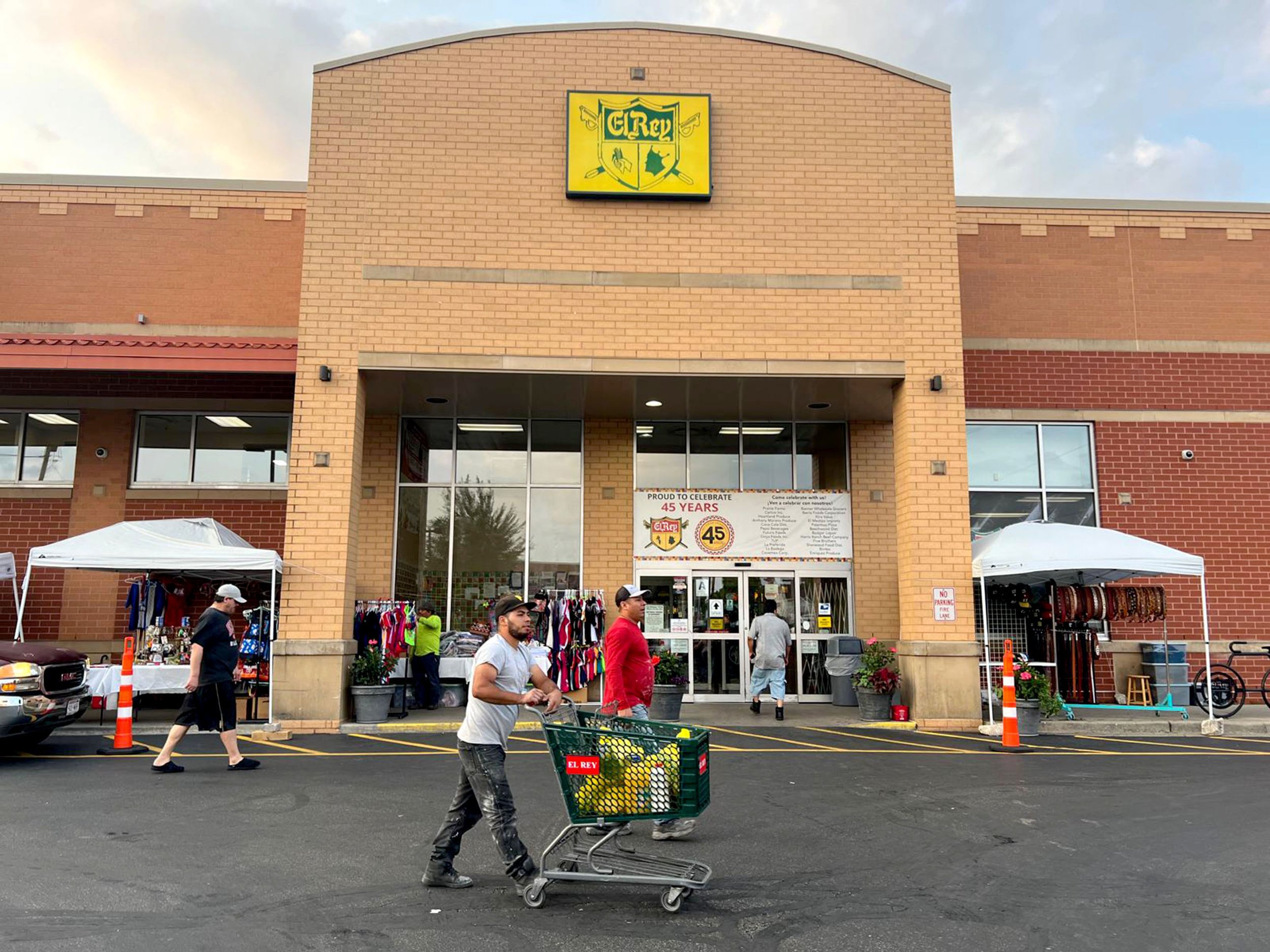Latino Voters Balance Stereotypes, Their Pocketbooks and Immigrants' Vital Role
A home with a yard sign promoting the candidacy of former President Donald J. Trump, underscores how tight the presidential race is, even in Latino neighborhoods. Photo by Alfredo Corchado
Latino immigrants provide crucial labor but face a backlash in the U.S. Heartland; those who are citizens may decide the election in Wisconsin.
Editor’s note: This story was co-published with Puente News Collaborative in partnership with palabra. Puente News Collaborative is a bilingual nonprofit newsroom, convener and funder dedicated to high quality, fact-based news and information from the U.S.-Mexico border.
Words by
MILWAUKEE – Fresh beginnings sprout in the most unusual of places.
For Enock Mendez and his friend Deriube Moreno, both recent arrivals from Nicaragua, their turning point anchors with rented chairs in a tidy and well-lighted corner barber shop here in Milwaukee, not far from where the Republican convention and a Democratic campaign event were held last summer.
“I left everything I knew behind: My family, my career, everything, but it was definitely worth it,” says Enock, 22, a fourth-year marine biology student, who now works multiple jobs, from cutting hair to cleaning up after events at the convention site. “I would do it all over again because once you cross the border the possibilities are endless.”
Donald Trump rails against the “Harris, Biden open borders,” accusing the administration of allowing an “invasion” of new migrants like Enoch to “infect” the nation. He’s staked much of his election chances on a promise to deport as many of the 11 million undocumented migrants as possible.
Barbers Enock Mendez and his friend Deriube Moreno, both recent arrivals from Nicaragua, work at a barbershop in South Milwaukee. They are among hundreds who crossed the U.S.-Mexico border seeking plentiful jobs in the Midwest. Photo by Alfredo Corchado
Yet, in Wisconsin and the handful of other states that will decide the new president in November, the vote may hinge on an unspoken truth: once past the border, newcomers like Enock and Deriube provide a critical source of labor and a new, if often reviled, energy to the communities where they settle.
In marking their ballots, these swing state voters — native born and naturalized alike — will balance disturbing and often exaggerated images of “the broken border” to the crucial need for new blood and dawning dreams. The decision they make will decide the election.
“No matter what happens at the border, a transformation of sorts takes place once the migrants arrive at their destination. The labor demand for them is huge,” says Armando Ibarra, a political scientist and demographic expert at the University of Wisconsin-Madison. “The harsh anti-immigrant rhetoric versus reality on the ground are two different things. But here they suddenly somehow coexist.”
Today’s immigrants, much like those who came before them, are viewed as either villains or victims, depending on who is doing the judging.
Consider them pioneers. Call them strivers.
In Milwaukee, along the Southeastern shore of Lake Michigan and down two-lane roads that cut into Wisconsin’s dairy and farmlands, the newcomers are remaking century-old neighborhoods and small towns once home to immigrants from Germany, Poland, Serbia, Ireland and elsewhere.
They’re reshaping the labor force and social fabric of the U.S. heartland even as the diverse and sometimes mutually antagonistic U.S. Latino community — some 65 million strong and growing quickly — struggles to realize its political clout.
Of course, the freshest arrivals — both legal and illegal — cannot vote. Even many Latinos with decades living here lack citizenship and voting rights.
Even so, though they comprise less than 4% of the total here in Wisconsin, the estimated 180,000 elegible Latino voters — most of Mexican heritage — could prove decisive in a hair-thin election.
Polls show a tight race in swing states, including Wisconsin.
Families visit El Rey grocery store in South Milwaukee to shop for their favorite foods reminiscent of their home countries. Photo by Alfredo Corchado
“Latinos might not be a large part of the electorate in Wisconsin, but they can certainly mean a difference in a close race,” says Sergio González, a historian at Marquette University and expert on Latino communities in Wisconsin. “And I think the same can be said in a number of different battleground states that are being floated around.
“We're not Arizona, we're not Texas, we're not California with sizable electorates,” he says. “But that doesn't have to be the number to make a difference in a place like Wisconsin.”
Among the other six states expected to determine the electoral college victory, Latinos comprise some 18% of registered voters in Arizona and 17% in Nevada. But they make up only 3 and 4% of voters registered in Michigan, Pennsylvania, Georgia and North Carolina.
In the working-class streets of Milwaukee’s southside, Democratic candidates’ share of the vote fell by as much as 8% between 2016 and 2020 in heavily Latino precincts, says Charles Franklin, who directs the opinion polls for Marquette University’s Law School.
Trump won Wisconsin by less than 23,000 votes in 2016. Biden defeated Trump in the state by fewer than 25,000 votes. Democrat strength lies in and around Madison, the state capital and in Milwaukee, where most Latinos live.
‘The hardest and most expensive thing was crossing the border. But once you cross the border, we found there is plenty of work for everyone.’
How or even if the Latino citizens will vote in November stands as an open question.
As with the U.S. population at large, U.S. Latino citizens list the economy as their primary concern. And like their non-Latino neighbors, many here will weigh images of the sometimes crowding of new migrants at the U.S. Mexico border against their own economic, social and family interests.
“They have integrated economically and think it’s not possible they are giving benefits to the new arrivals that they didn’t have,” says Mauricio Zermeño, 53, a Mexico City native who moved to Milwaukee in the early 1990s and now co-owns business that wires other migrants’ money to their home countries. “We pay taxes and are following the rules.”
Most of Milwaukee’s — and Wisconsin’s — migrant Latinos live in tightly packed residential blocks that once served as the homes of other immigrants from eastern or Central Europe in decades past.
Family-owned restaurants with names evoking memories of abandoned homelands stand near Catholic churches honoring saints from Poland, Ukraine and elsewhere. Food trucks selling Mexican tacos and other dishes ply the streets, offering affordable fare.
Taco trucks line large avenues of South Milwaukee, attracting large clientele from Mexico, Central America and beyond. Photo by Alfredo Corchado
There is crime here, yes, and drug addiction. Gangs have been a problem in the past, residents say. Drug counselors from private groups and medical teams from the Milwaukee fire department offer advice, Narcan and other aid on street corners.
Undocumented immigrants have not been able to obtain a drivers’ license in Wisconsin for the past dozen years. But on a recent Monday evening, nearly new cars and SUVs packed the parking lot of El Rey, the neighborhood’s largest grocery chain.
Entire families piled through the store’s doors. They judged the ripeness of mangos and other fruits freshly arrived from Mexico, crowded the meat counters selling cuts prized south of the border. Dairy workers and their families join the crush on weekends, driving in from the farms to the west.
Alexandra Guevara, communications director for Voces de la Frontera, an immigrant-rights group, says in Wisconsin “it’s very usual” for immigrants to “live in the shadows,” blaming a “broken immigration system” that kept tens of thousands of people “hiding in plain sight.”
“They are less engaged in their community because of the risks involved,” she says. “It’s part of a lifestyle in Wisconsin.”
Outside El Rey Foods supermarket, a middle-aged woman who identified herself as María sells perfumes and numerous Mexican trinkets, including aprons and religious icons like images of the Virgen de Guadalupe. She has lived in Milwaukee for 27 years, María says, all of them without documents.
María once tried to legalize her status but grew disenchanted at the slow legal process and high bills charged by immigration attorneys. Instead, she adds, “I gave to this country two U.S. born, wonderful children. My son is a student at Marquette and my daughter is a business owner.”
As for her, María, 54, says, “I still dream of returning to Mexico” with money saved and “buy my house and live my best days in my homeland.” She has never returned since she arrived in 1997, she says.
El Rey is the largest neighborhood grocery store in South Milwaukee. Photo by Alfredo Corchado
Small frame houses, many well-maintained with chairs and lounges on the front porch, stand shoulder to shoulder on nearby streets. American flags fly on some porches, Mexican and Central American ones on others. A few houses sport both.
It's hardly a secret among Wisconsin business leaders — whether at packing sheds, factories, restaurants or dairy farms — that many workers lack U.S. legal authorization to work. Many of the immigrants without documents land jobs using fake papers that employers, knowingly or not, accept. Others, especially at smaller companies, never get asked. The allure of good wages is a big draw, harsh winters regardless.
Support the voices of independent journalists.Until Dec. 31, your donations will be matched dollar-for-dollar. 
|
Citing U.S. Census Bureau, Wisconsin Gov. Tony Evers in July said that the state’s average wages were nearly $34 an hour, among the highest in the nation. Labor force participation, at about 65% of adults, was three points higher than the national average.
“Some would argue that it’s in the best interest of these industries to keep workers in the shadows,” says Ibarra, the academic. “We call it an ‘open secret,’ where immigration status and documentation are rarely examined at work.”
John Rosenow, whose family has been producing milk in Wisconsin for more than 175 years, estimates that nearly all the 30,000 workers on Wisconsin farms like his are immigrants. Studies suggest that perhaps three-quarters of those workers don’t have documents.
“Pass comprehensive immigration reform, which Congress won’t do, or don’t enforce immigration laws,” Rosenow says in parsing the farmers’ options. “If we can’t get a new deal, let the market decide workforce needs. Just don’t enforce the law.”
Like many other farmers, Rosenow says he can’t find Americans to work on his farm, even for as much as $20 an hour. Now, 13 of the 18 people he employs are Mexican, many of them part of an extended family from Veracruz state. Lately, recent arrivals from Nicaragua have been taking many of the state’s farm jobs.
Anti-immigrant talk caused disruption in his workforce in Trump’s first term, “leading to serious worker shortages throughout industry. When people realized he was all talk, many started to come back.”
Mural at a local park in South Milwaukee with Spanish text taken from a bible verse. Photo by Alfredo Corchado
Many of the newest arrivals come with court dates for asylum petitions and are allowed to work while their cases proceed. Others jumped the border without legal papers, often paying thousands of dollars to smugglers.
They’ve already braved criminal gangs, extortion-demanding officials and scorching badlands. They’ll be hunkering down through northern U.S. winters. Many, but not all, say they have no intention of going back.
Leaving their toddler with a relative back in Mexico, Miguel Pérez, 30 and his wife paid smugglers $25,000 to be brought across the Rio Grande through Central Texas and on to Milwaukee. They paid half the money up front — after selling a car and other belongings and borrowing from family and friends.
Now six months into their U.S. odyssey, the couple has paid off the smugglers and begun saving money. Miguel recently quit working 12-hour days on a food truck because of the long commute to job sites and from his South Milwaukee neighborhood. A fresh job will be no problem, he says.
While he looks, Miguel’s wife continues putting in hours at a Milwaukee packing house. Their lives revolve around that labor and the few blocks surrounding the room they rent. There isn’t time for much else.
“The hardest and most expensive thing was crossing the border,” Pérez says, chatting on the sidewalk in front of the border shop where the Nicaraguans toil. “But once you cross the border, we found there is plenty of work for everyone.”
—
Alfredo Corchado is the executive editor for Puente News Collaborative and the former Mexico/Border Correspondent for The Dallas Morning News. He’s the author of “Midnight in Mexico” and “Homelands.” @ajcorchado
Dudley Althaus has reported on Mexico, Latin America and beyond for more than three decades as a staff newspaper correspondent. Beginning his career at a small newspaper on the Texas-Mexico border, Althaus had an award-winning 22-year stint as Mexico City bureau chief of the Houston Chronicle. After a four-year run as a Mexico correspondent for The Wall Street Journal, Althaus covered immigration and border issues as a freelancer based in San Antonio for Hearst Newspapers. He has covered every Mexican presidential election since 1988, when Mexico's troubled transition to democracy began. @dqalthaus










